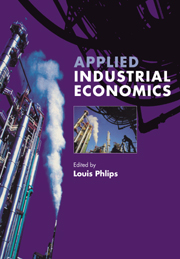Book contents
- Frontmatter
- Contents
- Preface
- Introduction
- I MARKET STRUCTURE
- II INDUSTRIAL PRICING AND PRICING SCHEMES
- III COMPETITION POLICY
- IV MERGERS AND MERGER CONTROL
- 17 Unprofitable exogenous mergers
- 18 Profitable horizontal mergers and welfare
- 19 Using the Herfindahl–Hirschman index
- 20 Cournot and merger control
- 21 Vertical mergers
- 22 Enforcement of the US merger guidelines
- 23 Enforcement of the European merger regulation
- Index
21 - Vertical mergers
Vertical mergers in multi-product industries and Edgeworth's paradox of taxation
Published online by Cambridge University Press: 21 September 2009
- Frontmatter
- Contents
- Preface
- Introduction
- I MARKET STRUCTURE
- II INDUSTRIAL PRICING AND PRICING SCHEMES
- III COMPETITION POLICY
- IV MERGERS AND MERGER CONTROL
- 17 Unprofitable exogenous mergers
- 18 Profitable horizontal mergers and welfare
- 19 Using the Herfindahl–Hirschman index
- 20 Cournot and merger control
- 21 Vertical mergers
- 22 Enforcement of the US merger guidelines
- 23 Enforcement of the European merger regulation
- Index
Summary
Introduction
The fundamental difference between comparative statics for single- and multi-product monopolists is a point that seems to have been largely forgotten; and its implication for the effects of vertical mergers have been completely overlooked. In 1897, Edgeworth (1925) showed that a tax on one of two substitute goods sold by a monopolist can result in the reduction of both prices. This result is known as Edgeworth's paradox of taxation. Seligman (1910) dismissed the result as an example of how mathematical analysis could produce absurd propositions, which prompted Edgeworth's (1899) reply.
Although the result seems no longer to be widely known, Seligman's comment has prompted several of the giants of economics to address this issue. Edgeworth (1910) himself returned to the question of whether the paradox is likely to occur more than a decade after the initial exchange with Seligman. He conceded that ‘(t)he improbability of the event … is considerable’ (p. 299), but cited the relative ease of constructing examples in which it arises, as evidence that ‘it (i.e., the improbability) is not enormous. …’ (p. 299). Hotelling (1932) made the most compelling argument to date that the paradox might occur in practice. He produced a quite plausible discrete example concerning different classes of railway service in which the paradox arises.
- Type
- Chapter
- Information
- Applied Industrial Economics , pp. 382 - 392Publisher: Cambridge University PressPrint publication year: 1998

